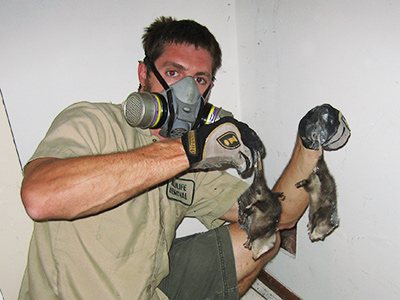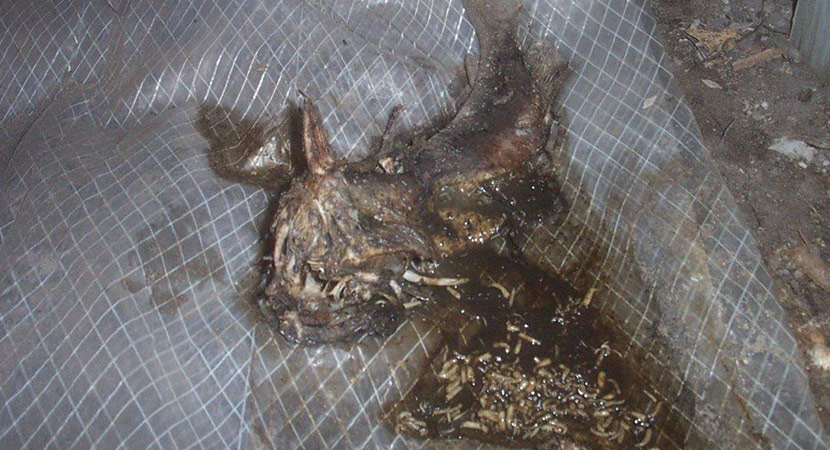Call me: 910-933-2132
Welcome to Fayetteville Dead Animal Removal! Got a terrible smell in your house, or do you see a dead critter on your property? We are an animal control company specializing in the removal of dead animals from your home, attic, basement, walls, yard, or any part of your property. You clearly don't want a dead animal in your house. Carcasses attract flies and give off terrible smells, not to mention the potential diseases rotting flesh can cause. Whenever we remove dead animals, we use 100% safe methods and make sure to disinfect your home and get rid of all traces of odor. Click here for Free Roadkill Removal and click here for Dead Pet Body Removal. For deceased wild animals in your home or property, call us anytime at 910-933-2132 to schedule an appointment for today! We come out fast! Some of the services we offer include:
- Dead Animal Removal
- Foul Odor Diagnosis
- Full Property Inspections
- House Damage Repairs
- Dead Body Location Services
- Proper Carcass Disposal
- Cleanup & Decontamination Services
- Deodorization Services
CALL US ANYTIME AT 910-933-2132

Removing a dead animal is an easy enough task when you know where the animal is. When the carcass cannot be located, however, things take a very different turn: a bad smell starts to linger, and an invasion of flies takes over. Other scavengers join the party, attracted by pheromones or scent, such as rats, mice, opossums, foxes, and raccoons. Stains can appear on surfaces and materials that come into contact with deceased animals, and it can even devalue your home or rental property. Here at Fayetteville Dead Animal, we have a wide assortment of services that can solve each and every one of these problems. It is more common that these critters will die in a dark, hard-to-reach area of your home or building, such as crawl spaces, wall cavities, roofs, attics, and basements; and in order to effectively resolve the problem, you’ll need to address every aspect of it. This includes locating and sealing entry points, removing and safely disposing of the carcass, repairing and restoring the area, and installing preventative tools and methods to stop future wildlife problems before they have a chance to start. Our fully-encompassing service from friendly, highly-trained, and fully licensed and insured professionals is the reason we are consistently rated the number one dead animal removal service in Fayetteville and North Carolina. Give us a call on 910-933-2132 to learn more, or to schedule a visit from one of our expert technicians.
What Prices Do We Charge?
Learn about dead animal removal costs - each situation is different!
What if you found roadkill or a dead animal such as a deer in a public place, and you want the city or Cumberland County services to remove it for free? Click here for Free Cumberland County Dead Animal Removal services. What if a farm animal like a horse, or your beloved pet dog or pet cat has died and you need the body taken away? Click here for Dead Pet Body Removal.
We are experts in dead animal removal, and take our job seriously. When removing dead animals, we do a COMPLETE job — not only do we remove the dead animal from your home or yard, we also decontaminate the area, deodorize it, and dispose of the animal or cremate it. If you aren't sure whether the stench in your house is due to a rotting carcass or another reason, we can sniff it out with our noses from our years of experience. We remove dead raccoons, dead opossums, dead skunks, dead squirrels, dead birds, even dead dogs and cats. We frequently remove dead rodents from inside walls, because poison kills rats and mice, who die in your house. We completely solve your dead animal problem by taking these steps:
- Sniff out the dead animal if it is somewhere in your home
- When necessary, for example if the animal is in a wall or under your house, cut a hole to remove the animal
- Remove the dead animal, safely and completely (and seal the hole if needed)
- Finish the job by decontaminating and deodorizing your home
- Properly dispose of the dead animal through incineration or other means
- Prevent it from happening again by finding out how they got in your house
Dead animal carcass removal is specialty work. Sometimes the job is simple, such as a dead opossum in the yard, in which case we can simply wear our gloves and respirator mask, bag the carcass, and take it away for incineration. Sometimes this is more complex, such as when the dead animal is under a home crawlspace, under a porch or deck or shed. Or if the animal is larger, such as a dog or a deer. The most complex cases are dead animals inside the house. The animal may have died inside the attic, or down in the walls, or the duct work, or any other part of the architecture. You may have a bad smell in your home, and you're not even sure what's causing it. We've removed not just dead animals, but rotting food, bad mold, etc. We specialize in locating the source of the smell, and we very commonly cut a hole in the ceiling or wall to remove the animal. We remove every bit of the carcass, mop up the juices, vacuum the maggots, spray it and wipe it down with disinfectant, cleaner, and we repair the hole we cut. In some cases we use ozone machines to neutralize odor.
Fayetteville Dead Animal Tip: Does using poison cause dead rats in the house?

Rats are always unwanted guests. They earned this reputation because of the damage they cause in homes and other properties.
Because of the level of damage that the critters cause and their uncanny ability to infest human environments, humans have continuously waged a war against rats.
Poisoning is one of the means through which humans handle a rat infestation problem. But, does poison cause dead rats in the house?
How rat poisons work
The active ingredients of rat poisons are toxic materials that work in different ways to kill the critters. Rat poisons could be anticoagulants. The anticoagulants stop the natural process of blood clotting. Thus, anticoagulants initiate internal bleeding.
Rats need to consume enough of the active ingredients before they cause sufficient internal bleeding to kill the rat. So, the rats can suffer for long periods before they actually die. This undue suffering and maltreatment are some of the reasons why the use of rat poisons is discouraged.
Apart from the anticoagulant rat poisons, rat poisons could directly attack essential systems like the respiratory and nervous systems.
Irrespective of the nature of the active ingredient of rat poisons, they are not exactly fast-acting options. Poisons will not kill rats immediately when they are used.
Where rats die after they are poisoned
After rats are poisoned, they begin a long journey on the road to death. This journey causes serious exhaustion. Due to the exhaustion and dehydration, the rats could search for water and food outdoors. In this case, they could die outdoors.
Poisoned rats could also be so severely exhausted that they cannot leave indoor environments. In such cases, they can die in their nests, as well as hidden areas like walls, ceilings, and other crawlspaces.
A popular misconception about the use of rat poisons is that it causes the critters to run outdoors and die there. This is not exactly the case. Rats will only go outdoors and die there when they are highly dehydrated from the effects of the poisons and not too exhausted to look for food and water.
So, rats can die indoors and outdoors after they are poisoned. Although there is no specific research on the subject, rats are more likely to die indoors when they are poisoned indoors. The critters are more likely to die close to their nests. They may not want to brave the outdoors in their specifically delicate state.
Yes, using poisons causes dead rats in the house. It is very possible for rats to die in the house after they are poisoned. The poisoned rats could die in hidden spaces and begin to decay there. The decaying critters will produce bad odors, which gives away the presence of dead critters in the area.
The possibility of rats dying inside a house when they are poisoned is another side effect of using poisons. The dead critters will produce bad odors. The carcasses can also be a source of disease. Rats carry diseases that can be contracted through direct contact with the carcasses. Pets and kids could particularly contract diseases from the carcasses of rats.
We should also mention the risk of poisoning unintended critters, another side effect of the use of rat poisons. If the rats die outdoors, the carcasses could be consumed by scavengers. These scavengers consume the poison indirectly, and it poisons them. Pets like cats that hunt and eat rats could also be victims of rat poisoning.
The use of poisons causes dead rats in the house, especially if the rats were poisoned in the house. Thus, the use of poisons comes with the extra requirement of having to deal with a dead animal. Remember, the critters can die anywhere, including in hidden areas. The dead animal will produce bad odors and attract other pests to the area.
Poisoning rats is associated with numerous issues. Firstly, poisoning is an inhumane method for getting rid of the critters. Rats could suffer for extended periods after they are poisoned before they die. Also, they could die in the house and cause bad odors or spread serious diseases. Poisoning rats is also associated with the risk of secondary and tertiary poisoning of other critters and distorting the ecosystem. With its numerous cons, the poisoning of rats cannot be described as an effective method for getting rid of the critters.
We service nearby towns such as Fayetteville, Hope Mills, Fort Bragg, Spring Lake, Linden, Eastover, Stedman, Wade, Godwin, Vander,.